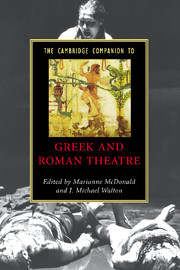Book contents
- Frontmatter
- Introduction
- PART I: TEXT IN CONTEXT
- 1 ‘Telling the tale’: a performing tradition from Homer to pantomime
- 2 Ancient theatre and performance culture
- 3 Religion and drama
- 4 The socio-political dimension of ancient tragedy
- 5 Aristotle’s Poetics and ancient dramatic theory
- 6 Politics and Aristophanes: watchword ‘Caution!’
- 7 Comedy and society from Menander to Terence
- 8 Lost theatre and performance traditions in Greece and Italy
- PART II: THE NATURE OF PERFORMANCE
- Playwrights and plays
- Glossary of Greek and Latin words and terms
- Select bibliography
- Index
2 - Ancient theatre and performance culture
from PART I: - TEXT IN CONTEXT
Published online by Cambridge University Press: 28 January 2009
- Frontmatter
- Introduction
- PART I: TEXT IN CONTEXT
- 1 ‘Telling the tale’: a performing tradition from Homer to pantomime
- 2 Ancient theatre and performance culture
- 3 Religion and drama
- 4 The socio-political dimension of ancient tragedy
- 5 Aristotle’s Poetics and ancient dramatic theory
- 6 Politics and Aristophanes: watchword ‘Caution!’
- 7 Comedy and society from Menander to Terence
- 8 Lost theatre and performance traditions in Greece and Italy
- PART II: THE NATURE OF PERFORMANCE
- Playwrights and plays
- Glossary of Greek and Latin words and terms
- Select bibliography
- Index
Summary
Definitions and methods
Aristotle's definition of tragedy may seem odd to modern viewers for whom psychological drama is the norm:
'Tragedy is a representation (mimêsis), not of people, but of an action (praxis)... They do not act so as to represent character (êthê) but they include character on account of the actions'
(Poetics 1450a20-23)Yet the formulation deserves renewed attention in light of the advances made by critics and theorists in the last few decades. Tragedy - and, we might say, drama as a whole - is primarily about action. Aristotle's own reference to the etymology of the Greek word drama (from the verb dran, 'act, do') asserts this in another way, although he simply includes the suggestion in his report on possible non-Athenian origins for theatrical activity (Poetics 1448a30-38).
To say that tragedy, comedy and satyr play are actions is not to deny that they are also masterpieces of verbal artistry. For readers since late antiquity, it is as texts that these dramas have most often been encountered. Well into the twentieth century, the fascination and power of Greek plays have been found in their textual qualities, whether imagery, rhetoric, sound or structure. (The comparative undervaluation of Roman drama in the twentieth century stems from this fixation, abetted by New Criticism and related interpretive modes.) At the same time, however, the increasingly fruitful rediscovery of classical drama as live performance, starting in the late nineteenth century, has generated a body of valuable work, by scholars and producers, on stagecraft, spectacle, the actor's body, masking, the meaning and use of space and other features of theatre beyond the purely verbal.
- Type
- Chapter
- Information
- The Cambridge Companion to Greek and Roman Theatre , pp. 36 - 54Publisher: Cambridge University PressPrint publication year: 2007
- 2
- Cited by



